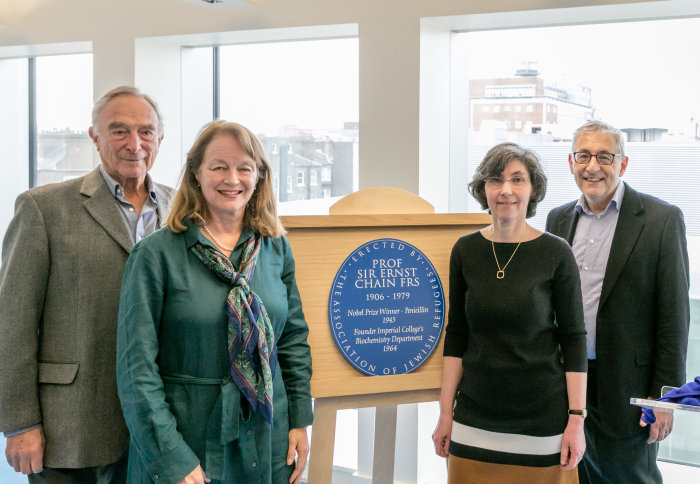Imperial professor honoured with plaque from the Association of Jewish Refugees

(L-R) Frank Harding, Alice Gast, Judy Chain and Benny Chain with the plaque
A new plaque has been unveiled for Professor Sir Ernst Chain, a Nobel Prize-winning chemist who set up the Department of Biochemistry at Imperial.
The AJR’s plaque scheme honours prominent Jewish émigrés from Nazism who made a significant contribution to their adopted homeland.
The plaque, unveiled by Ernst Chain’s children Judy and Benny Chain, and Trustee of the Association of Jewish Refugees (AJR) Frank Harding, will be attached to the outside of the Sir Ernst Chain building on the South Kensington campus.
In the years to come, faculty, students, alumni and visitors to this campus will be inspired by his accomplishments, humbled by what he endured, and they will be reminded of the never-ending need to embrace academic freedom. Professor Alice Gast President
Born in Berlin in 1906, Ernst Chain received his degree in chemistry from Friedrich Wilhelm University in 1930 but fled Germany immediately after the Nazis came to power, arriving in England in April 1933.
Together with Alexander Fleming and Howard Florey, Professor Chain was awarded the Nobel Prize for Physiology or Medicine in 1945 ‘for the discovery of penicillin and its curative effect in various infectious diseases’. Professor Chain devised methods for isolating, purifying and concentrating penicillin from gallons of mould broth so that it became usable as a drug.
Professor Chain arrived at Imperial in 1961 and was instrumental in forming the Department of Biochemistry and the construction of a new building to host it.
Much of the work of the department was linked to antibiotic research and associated fermentation technologies, and strong links were forged with the pharmaceutical industry. The construction of the building, including a state-of-the-art fermentation pilot plant, was funded by the Wolfson Foundation.
Professor Chain and his family occupied an apartment on the seventh floor of the building. The plaque was unveiled in the seventh-floor common room, which was once the family’s dining room.
In 1973 Professor Chain retired from the Chair of Biochemistry and became an Emeritus Professor until his death in 1979.
In 2012, in recognition of the major contribution of Professor Chain to medicine and his work in the Department, the building where he lived and worked was renamed: The Sir Ernst Chain Building – Wolfson Laboratories.
Speaking at the event, Professor Alice Gast, President of Imperial, said: “In the years to come, faculty, students, alumni and visitors to this campus will be inspired by his accomplishments, humbled by what he endured, and they will be reminded of the never-ending need to embrace academic freedom and to promote the understanding and acceptance of differences that should bring us together and make us stronger.”
It is with great pleasure that we are recognising and honouring Prof Sir Ernst Chain, the pioneering and eminent scientist whose endeavours and research have profoundly impacted and benefitted people throughout the world. Frank Harding Trustee, Association of Jewish Refugees
Benny Chain, who is a Professor of Cell & Molecular Biology, talked about living in the building and his father’s breakthrough in bringing microbiology and organic chemistry together – a practice common in Germany but rare in the UK at the time, but which helped him bring penicillin to the masses.
He said: “A by-product of putting up this plaque is to remind us that refugees are enormously valuable to the country they settle in, but also that the health of a society is often reflected by how we treat those who come into the society from outside and need help.”
Frank Harding, who devised the plaque scheme, said: “It is with great pleasure that we are recognising and honouring Prof Sir Ernst Chain, the pioneering and eminent scientist whose endeavours and research have profoundly impacted and benefitted people throughout the world.
“We believe that these commemorative plaques will help form a tangible link between illustrious refugees who have made an everlasting contribution and the local community as well as fascinating residents and visitors. As well as being instructive and informative, they bring the past into the present, and they perpetuate the memory of the person being honoured.”
-
New imagery by Dan Weil.
Article text (excluding photos or graphics) © Imperial College London.
Photos and graphics subject to third party copyright used with permission or © Imperial College London.
Reporter
Hayley Dunning
Communications Division







